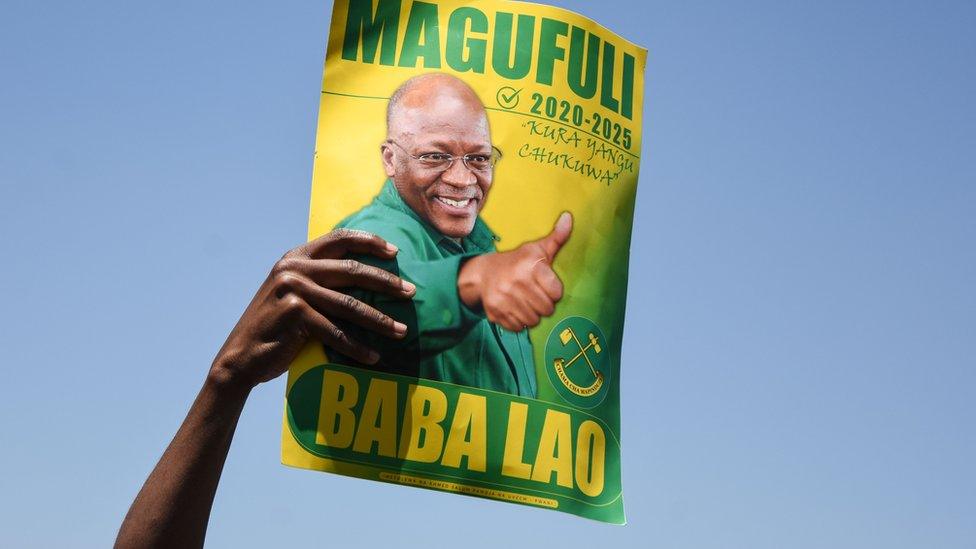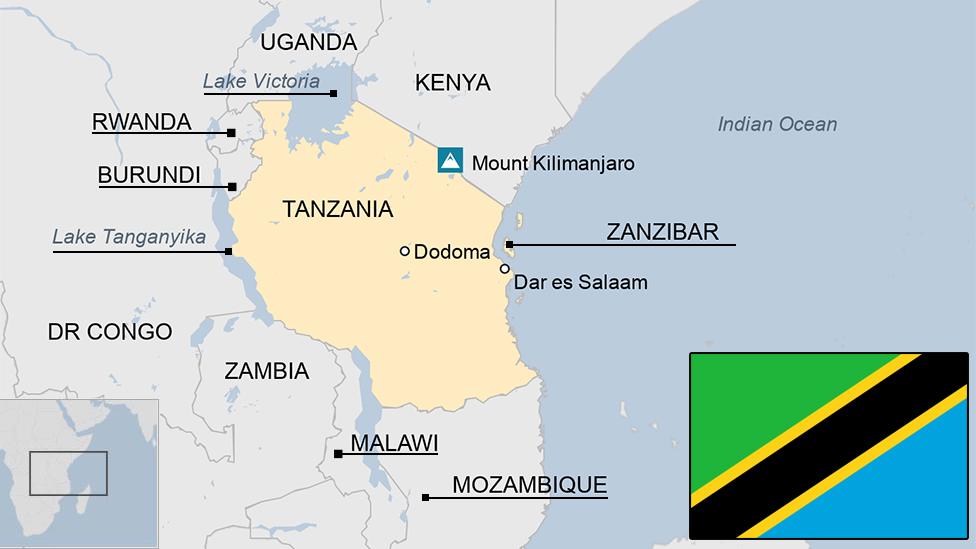Tanzania elections: Why pop stars are hailing President Magufuli
- Published

Baba Lao, a song by Africa's top star Diamond Platnumz, has been remixed to praise President Magufuli
"Bongo flava" stars are wowing the crowds in Tanzania with their election beat at mass rallies across the country.
At events for the governing Chama Cha Mapinduzi (CCM) party, the lyrics of recent hits have been changed to praise President John Magufuli, who is seeking a second term in office on Wednesday.
Pop star Diamond Platnumz has remixed his popular song Baba Lao - a Swahili phrase that loosely means "Their Boss" - to "Magufuli Baba Lao".
Allow YouTube content?
This article contains content provided by Google YouTube. We ask for your permission before anything is loaded, as they may be using cookies and other technologies. You may want to read Google’s cookie policy, external and privacy policy, external before accepting. To view this content choose ‘accept and continue’.

It not only lauds the president, but also Vice-President Samia Suluhu, Prime Minister Kassim Majaliwa and other leaders, as well as CCM.
The opposition too have musicians on the campaign trail, though not as many.
This tactic - to appeal to young voters - is hardly surprising given that about two-thirds of Tanzania's population is under the age of 25.
Historically too, it is not unusual for musicians to compose political songs, says Dr Viscencia Shule, a University of Dar es Salaam lecturer and expert on the performance arts.
"Artistes and musicians have been involved in the struggle for liberation in Tanzania and it continued that way post-independence. They have been used by the political class."
'Loyalty is key'
But Dr Shule does not believe all the praise-singing is genuine.
This mainly comes down to the strict laws introduced over the last five years to keep musicians in line - and a president who demands loyalty.

Diamond Platnumz owns a record label as well as a TV and radio station
In July, President Magufuli got two long-time rivals - Diamond Platnumz and Alikiba - to attend a rally in the capital, Dodoma, where he made the musicians bury the hatchet.
Another big star, Harmonize, also came along - even though he had also fallen out with Diamond Platnumz after leaving his record label.
"I feel good when I see Alikiba seated next to Diamond. When you see Harmonize, who left Diamond, praising him in public, that's the unity I want," the president was quoted as saying.
'Decadent behaviour'
But Diamond Platnumz has not always seen eye to eye with the authorities - and over the last few years has had to apologise to them multiple times.
His greatest climbdown was in 2018 when he fell foul of strict laws which include regulating the "decadent behaviour" of musicians - in the words of one cabinet minister.

You may also be interested in:

The regulations have been around for years, but are now being fully enforced by the country's arts council, known by its Swahili acronym Basata, which often bans songs considered immoral or insulting.
In April 2018 Diamond Platnumz was questioned by police after posting on Instagram a video clip of himself playfully kissing a woman.
Eight months later he was banned from performing in Tanzania after he played a song which Basata banned for being sexually suggestive.
The song - called Mwanza - included lyrics with the Swahili word for "horny", and dancers are seen in a video simulating sex.
At one stage Diamond Platnumz threatened to leave the country so angered was he by the clampdown.
But in the end he backed down and took to social media in December 2018, asking for "forgiveness" from Basata.
This was probably a savvy move as the musician has built up quite a business empire - with his own record label, TV and radio station.
'The fear factor'
So it is through Basata that musicians are kept on a tight leash and have learnt over the last five years that they must knuckle down.

Rapper Nay wa Mitego (l) was greeted by well-wishers in 2017 after he was released following his arrest
Even in September, Diamond Platnumz's radio station was taken off air for a week for airing some graphic material.
"Some circumstances can push them to [sing praises] to save their own interests," says Dr Shule says. Some musicians, often with dependents and extended families, live on the breadline.
"Some are happy to do it, just to be seen… But there is the biggest factor - fear," she adds.
Some may believe they can get some favours from President Magufuli, including being appointed to state positions.
Diamond Platnumz's manager Babu Tale, with whom he co-founded the WCB music label, has joined the political race and is set to become a CCM MP as he faces no rivals in his constituency.
There are other artists who are seeking political positions in the elections, most of them on a CCM ticket, including popular rapper Mwana FA.
If they don't sing for the ruling party, they are seen as supporting the opposition"

"Artists are forced to sing for various reasons," says Dr Shule.
"The majority of them obviously don't want to. But if they don't sing for the ruling party, they are seen as supporting the opposition.
"And if they are in opposition they will suffer the consequences... the opposition has really suffered," the academic says.
A case in point is rapper Roma Mkatoliki, famed for his anti-government songs, who says he was abducted by four unknown armed men in April 2017, tortured and then dumped near the ocean in Dar es Salaam three days later.

Tanzania's election rivals:

Last year, he was reprimanded for a song criticising the government, which radio stations opted not to play.
Rapper Nay wa Mitego was also arrested in 2017 for his song which included the line: "Is there still freedom of expression in the country?"
He has seemingly refused to be cowed, and is on the campaign trail for the opposition Chadema party.
But he has not had any songs banned over the last three years - and appears to mask any criticism in ways it would be difficult to pin down exactly what he is referencing.
In a recent track, Mungu Yuko Wapi? meaning "Where is God?" he questions God's existence and his faith, asking why God allows dictators to exist and behave like gods.
Allow YouTube content?
This article contains content provided by Google YouTube. We ask for your permission before anything is loaded, as they may be using cookies and other technologies. You may want to read Google’s cookie policy, external and privacy policy, external before accepting. To view this content choose ‘accept and continue’.

Self-censorship has become a matter of survival these days in Tanzania - and in fact if asked, Nay wa Mitego might or might not say whether the song had anything to do with the country.
- Published2 May 2023
